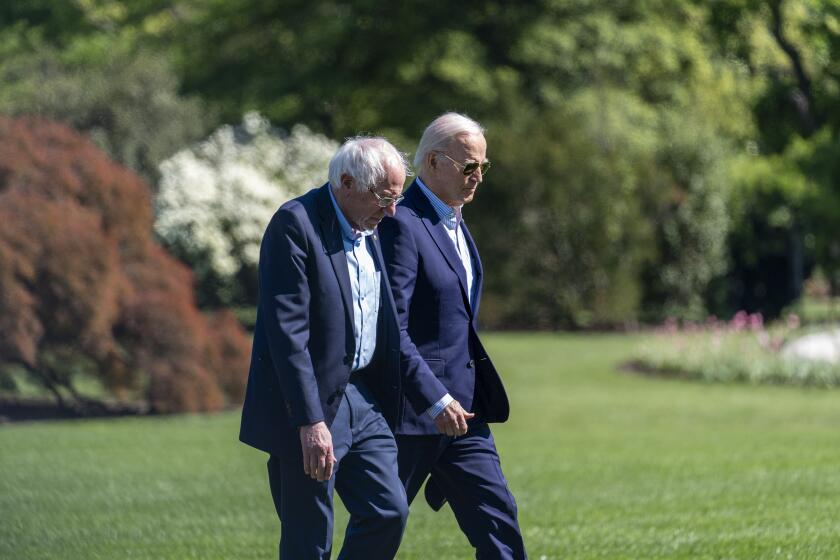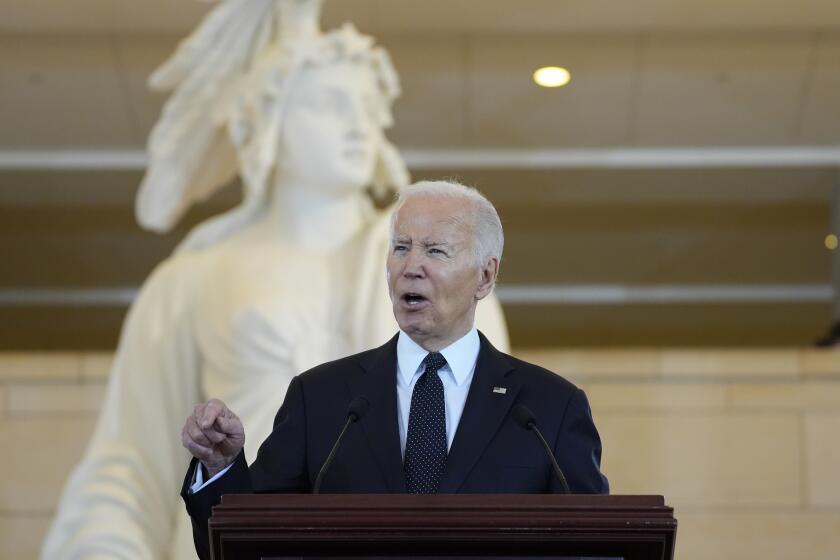Thrust Onto the Throne of an Iraqi District
U.S. Army Capt. Joe Ewers came to Iraq expecting to chase down Saddam Hussein and his henchmen, but it didn’t work out that way. He’s been thrust into the role of civil administrator and is finding it a tougher, more complex and thankless job than he ever imagined.
Ewers, 31, wields considerable military power as an armored company commander in control of a 100-block zone of downtown Baghdad. It was assigned to him by his 1st Armored Division. His 14 Bradley armored personnel carriers rumble through the streets of the capital two or three times a day.
When he is not displaying American military might, he becomes the near-absolute ruler of 300,000 Iraqis who live in his district, a role he is not sure he is up to. In this capacity he is responsible for enforcing bans on sidewalk sales of liquor and contraband gas, responding to emergency police calls, making sewage station repairs and countless other tasks.
His most daunting task is promoting and forming Baghdad’s embryonic democracy. He recruits and directs two neighborhood advisory councils that are viewed by the U.S.-led administration of Iraq as the building blocks of the country’s future elected government.
Ewers has found democracy to be a hard sell in a country accustomed to repression and state-sponsored mayhem. That and the difficulties he has had meeting residents’ expectations in administering his densely populated patch of Baghdad say much about the obstacles ahead as Iraq lurches from dictatorship to democracy.
“No one trusts anyone. It’s all about themselves,” Ewers said. “Now all of a sudden they have to obey laws because it’s the right thing to do and because they should take some societal responsibility.”
But the Iraqi “civic character” is atrophied by years of fear and mistrust and will take years to rehabilitate, Ewers said.
Half the 50 merchants, teachers and professionals he approached about joining his two groups refused for fear of reprisal from Hussein loyalists. Even after getting enough volunteers to form the councils, his efforts to sell the members on the benefits of joint decisions for the common good met with blank stares.
“How a free government works was second nature to me, but to them it was like an obscure mathematical proof,” Ewers said. “They wanted me to decide things for them.”
Council member Mohammed Rubayai said fear was justified, that he was constantly threatened by neighborhood thugs who call him a spy for the Americans. “We are trying to prove to our people that the United States is bringing positive changes, something good to the people,” Rubayai said.
The neighborhood councils are slowly progressing. The group representing the Karada district of Baghdad is now “self-directed,” Ewers says. The agenda at a night meeting last week included items such as parking problems and public drunkenness. Ewers promised that his soldiers would enforce the ban on the sale of alcoholic beverages by street vendors and would increase after-curfew patrols of market areas in response to council complaints about security. He declined to authorize an armed neighborhood watch.
There are some things he can’t fix right away.
One of the council’s demands is that Ewers evict squatters who have occupied the hundreds of apartments in the zone abandoned by the families of Republican Guard and Baath Party members. The squatters cause public disorder, and many disobey the U.S. military’s ban on public firing of weapons in the air, said Suham Abdel Ameer, one of three female council members.
Ewers agreed it was a problem, saying 80 people in Baghdad were killed by celebratory arms fire after Hussein’s two sons were slain in Mosul in July.
But evicting squatters creates another problem Ewers can’t solve: where to put the displaced families. The U.S.-led administration has announced plans for a camp for displaced people but has not yet built it, Ewers said. An order from battalion headquarters to evict people from one house in the zone was rescinded after the captain arrived to find 80 people living there, “at least half of them under the age of 10 -- I couldn’t just put them out on the street.”
Residents in his zone also demand that he restore electricity and water -- which Ewers is in no position to do. But he understands their impatience. “Public services need to be established before anyone here feels indebted to society,” Ewers said.
“I can shift combat power around the zone at the drop of a hat. What I can’t do is control the power grid or make more millions of barrels of oil be produced in the country. I can’t do a lot of infrastructure things,” he said. “But no matter how many times I explain, they keep asking.”
Ewers and his men recently delivered 80 desks, doors, windows, ventilation fans and lamps to the looted Al Ewiya primary school, the first recipient of his battalion’s Operation Wisdom school aid project.
Headmistress Jahan Salim Janabi gave Ewers a rare gift: a thank you.
“Capt. Ewers has a nice smile and a nice way of dealing with people,” Janabi said. “As we in Iraq say, he entered my heart without any permission.”
Others of the neighborhood council, who were present for the presentation, weren’t as grateful. Fauzi Nassani complained that the student desks were flimsy, a point he demonstrated by standing on one bench until it broke, an embarrassing moment for the young captain.
“You should ask us to get information on contractors before you award this kind of work. You pay for top quality and you have been cheated,” Nassani said.
Ewers barely contained his ire toward Nassani. “I am not smiling. I don’t think that was necessary at all,” he said. But he later persuaded the contractor to reinforce the desks.
In a city deeply distrustful of the local police force, Ewers unwillingly also has become the go-to guy when there is a law enforcement problem. He is sympathetic. He describes the new Baghdad police force, which the U.S. Army is training, as brutal, corrupt and “a bunch of pansies afraid to put themselves in the line of fire.”
Ewers admits that he enjoys the responsibility that the Army has heaped upon him.
He was a troubled Cincinnati youth who joined the Army at 17 to “grow up.” He fought on the front lines of Desert Storm. He found that he liked military life, combat and being depended upon.
His superiors took note. He was one of 150 enlisted men and women in 1992 invited to attend the one-year West Point Preparatory School course for admission to the military academy. He later graduated in the top 10% of his class at West Point.
His is the face of the evolving U.S. occupation force here, one that will last longer and be much more complex than Ewers and his fellow soldiers expected.
“I am the monarch of the zone. It’s a burden in many ways, but the weight of having a lot of authority rests on us to do the right thing,” Ewers said.
More to Read
Start your day right
Sign up for Essential California for news, features and recommendations from the L.A. Times and beyond in your inbox six days a week.
You may occasionally receive promotional content from the Los Angeles Times.






